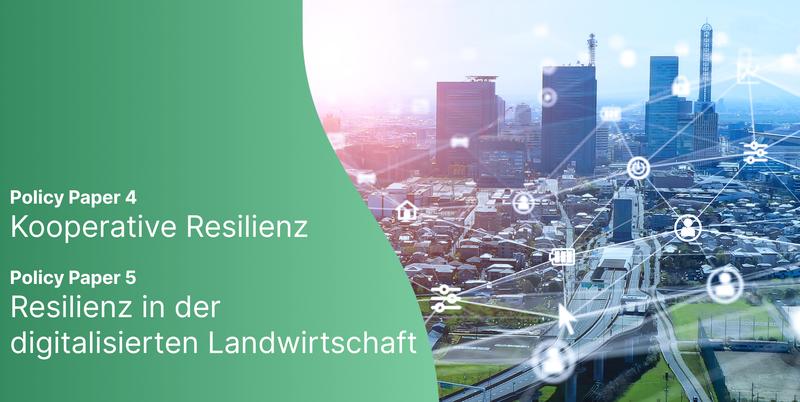Cooperation during a Crisis and Resilience in Digitalized Agriculture
emergenCITY publishes two new Policy Papers
emergenCITY publishes two new Policy Papers

Year by year, emergenCITY is publishing its most remarkable research results as policy papers. These publications are not only aimed at a scientific audience, but also set fundamental cornerstones as guidelines and analyses for decision-makers in crisis and disaster management. To this end, emergenCITY has already published a policy paper explaining the basic need of resilience in today’s and tomorrow’s information and communication technology (Policy Paper 1). This was followed by an examination of the preparedness of major German cities for the crisis scenario of a long-lasting power outage (Policy Paper 2) and a real case analysis of the coordination of disaster management during the floods in the Ahr valley in Germany (Policy Paper 3).
Now there are two new publication. The fourth emergenCITY Policy Paper provides guidelines for cities and municipalities on cooperative participation processes with citizen involvement in the development of crisis management. Policy Paper 5 highlights dependencies of German agricultural businesses that increasing digitalization in the agricultural sector entails.
Cooperative Resilience: A Guide for Cities and Local Authorities on Citizen Participation in Disaster Management of emergenCITY scientists Michèle Knodt, Alice Engel, Hans-Joachim Linke and Christine Quittkat as well as Sonja Petersen and Marie Kluge
Urban disaster management requires the cooperation of public authorities, security organisations, private companies and citizens. Successful disaster management requires the early involvement and (practised) regular cooperation of all stakeholders. Participation plays a central role in this, as it increases the quality and acceptance of decisions: it improves decision-making processes, builds trust and strengthens informal networks. The levels of participation range from information to joint development of solutions. The ideal-typical sequence of a cooperative participation process for the development of a crisis management plan includes: clarifying the target group, obtaining the opinions and preferences of citizens and stakeholders, developing options in workshops to discuss and define solutions, providing feedback on the results to participants, and actively integrating the results of the participation process into the political decision-making processes. Co-creation processes are essential for enhancing urban resilience and managing complex crises, as they improve the quality and acceptance of decisions.
Policy Paper no 4 is available to download free of charge here and can also be found together with all other policy papers on our website.
Resilience in Digitalised Agriculture: Dependencies of German Farmers on Communication and Energy Infrastructure of emergenCITY Professor Christian Reuter and Franz Kuntke
Agriculture is experiencing continuous digitalization, with an increasing importance of data for the tools used. In contrast to other critical infrastructures, the average agricultural business has a small number of employees. The requirements for agricultural technology, its implementation and the regulations therefore differ from other critical infrastructures. The effects of current trends such as smart farming on the resilience of the sector and dependencies on other infrastructures remain unclear. But some aspects of agricultural digitalization must be viewed critically in order to avoid security risks in future: Products must have secure default settings and the need for cloud connectivity should be questioned more frequently – both for stronger security and resilience to infrastructure failures and the high need for data protection in agriculture. With the right developments, digitalization can not only be made secure, but also have a positive effect on the resilience and efficiency of farms.
Policy Paper 5 is available to download free of charge here and can also be found together with all other policy papers on our website. Do you have any further questions about this Policy Paper? Please contact Christian Reuter via reuter@peasec.tu-darmstadt.de.